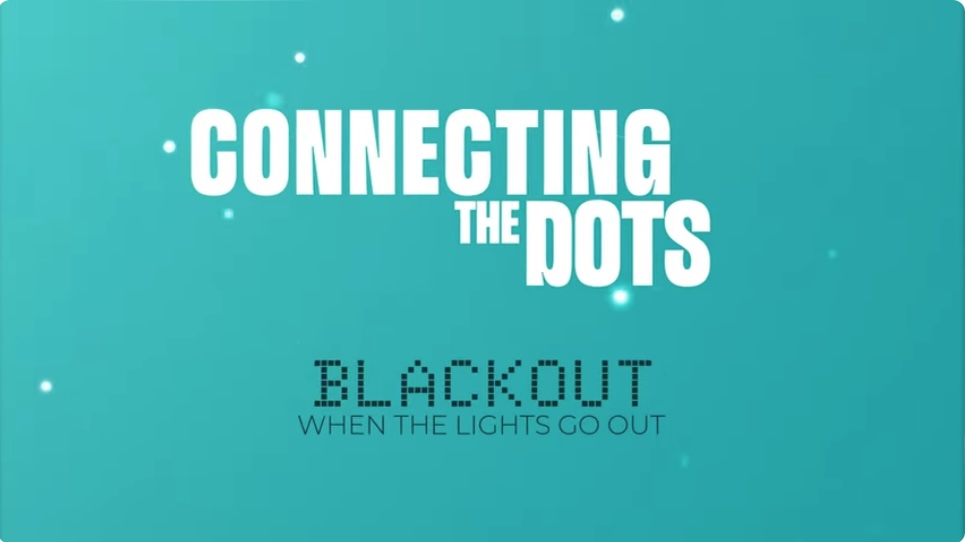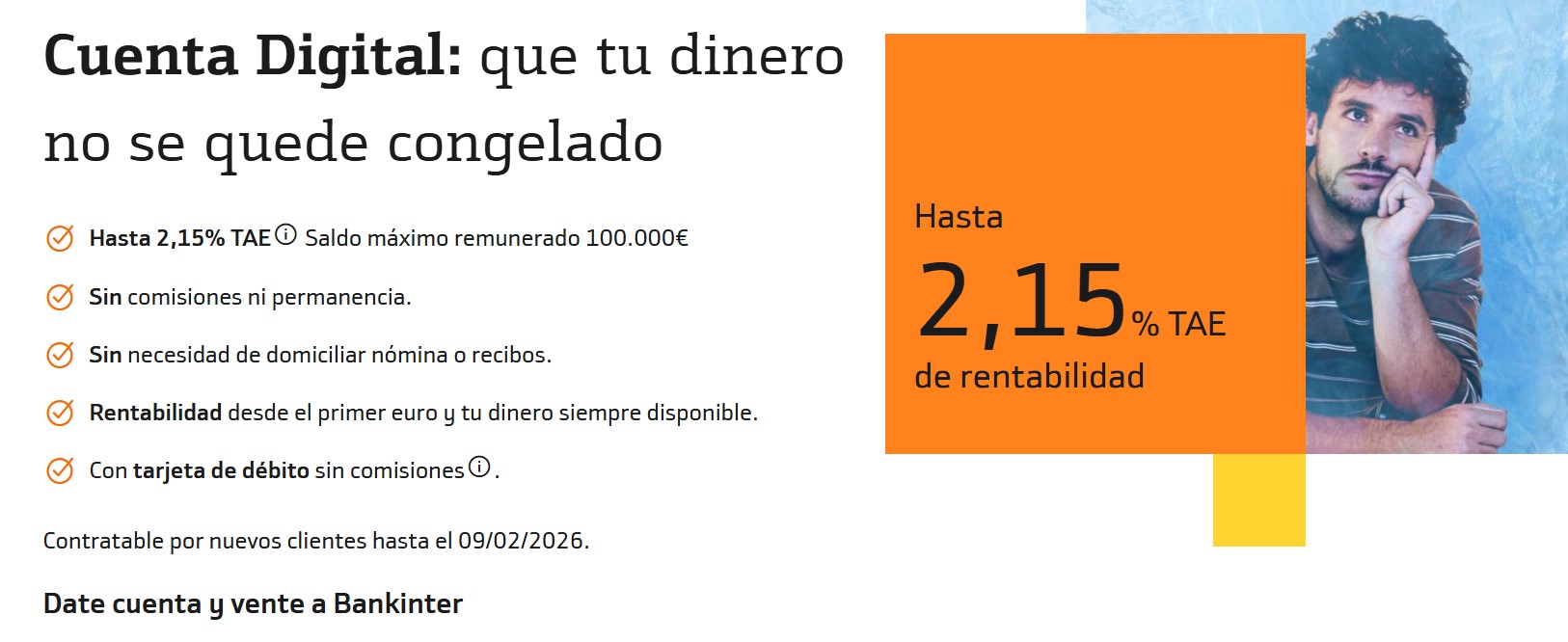As part of our global social commitment, at Esade Alumni Social we support inclusive businesses that generate economic benefits for the most vulnerable local communities.
Esade Alumni Social and the international organization Ayuda en Acción have joined forces to promote entrepreneurship and technology through inclusive and sustainable businesses under the Designing Opportunities platform (formerly Social Solver). The result of this collaboration is a joint project that aims to bring innovation and entrepreneurship to those who need it most, creating economic opportunities and improving the living conditions of their communities.
Our vision with this program is to offer the Esade community a new type of volunteering in which:
- Entrepreneurial spirit is encouraged to create a positive and sustainable social impact.
- Teamwork and collaboration are promoted among Alumni and students from different countries, disciplines, and age groups.
- Progress is made toward the United Nations Sustainable Development Goals (SDGs), particularly poverty eradication and inclusive development.
- Real impact is achieved as the best proposed ideas will be implemented on the ground by the local Ayuda en Acción team.
In the first edition, the challenge focused on the self-sufficient and productive development of fishing communities in Honduras, tackling a social entrepreneurship challenge with a strong technological component.
In this second edition, the challenge launched in February 2025 took place in northern Mozambique. There, Ayuda en Acción focuses its work on improving employment opportunities in Cabo Delgado and Maputo through initiatives in agribusiness, micro-entrepreneurship, and labor inclusion—such as Mapiko, an entity funded by cooperation funds and supported by the Ayuda en Acción Foundation as part of the Work4Progress program of Fundación La Caixa.
Based on the analysis of the social enterprise Mapiko—its business and market plan, local context, and similar inspiring cases—the challenge consisted of proposing innovative ideas to help Mapiko reach more farmers, diversify its production lines, become more resilient to social and climate changes, and achieve financial self-sustainability.
¿Why Mozambique?
 Ayuda en Acción has been working in Mozambique since 2006, implementing programs in Cabo Delgado and Maputo focused mainly on children, adolescents, youth, and women in local and displaced communities.
Ayuda en Acción has been working in Mozambique since 2006, implementing programs in Cabo Delgado and Maputo focused mainly on children, adolescents, youth, and women in local and displaced communities.
The third phase of the Work4Progress (W4P) program by Fundación La Caixa is currently underway in Cabo Delgado province. This program has been key to promoting labor integration and job creation. To this end, Ayuda en Acción works on improving employment opportunities through initiatives in agribusiness, micro-entrepreneurship, and labor insertion.
One of the main challenges is to achieve the sustainable scaling of Mapiko, an agricultural marketing entity that supports small local producers. It has proven crucial in increasing farmers’ incomes but faces significant challenges in terms of expansion, diversification, and sustainability—without compromising its social mission. That’s why Ayuda en Acción seeks to design a scaling model that allows Mapiko to grow sustainably and profitably while adapting to Mozambique’s economic, climatic, and social realities, and staying true to its mission to support smallholder farmers.
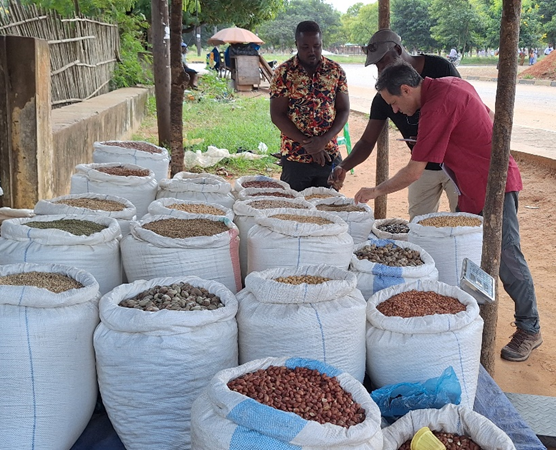 This is where the Esade community plays a key role. Through the Designing Opportunities platform, Esade Alumni and students have presented a set of viable ideas, recommendations, and tools to strengthen Mapiko's strategy for growth, diversification, and sustainability—ensuring its social mission is not only preserved but enhanced.
This is where the Esade community plays a key role. Through the Designing Opportunities platform, Esade Alumni and students have presented a set of viable ideas, recommendations, and tools to strengthen Mapiko's strategy for growth, diversification, and sustainability—ensuring its social mission is not only preserved but enhanced.
Mozambique is one of the poorest countries in the world. 60% of the population lives in extreme poverty. It is also highly vulnerable to climate change, ranking 5th among 180 countries on the Climate Risk Index (2000–2019).
The average age is 17.6 years. Life expectancy is 65 for women and 59.1 for men. Under-five mortality is 61.1 per 1,000 live births.
The national literacy rate is 60%, but only 50% among women. Schools suffer from poor infrastructure and poorly trained teachers. School absenteeism—especially among girls—is common. 80% of the population depends on subsistence farming, with very limited access to markets due to major shortcomings in transport, energy, services, and low productivity. 95% of agriculture is rain-fed, making it highly exposed to climate change and seasonal variations.
What is Mapiko's Challenge to the Esade Community?
 Mapiko, as a social enterprise, is a prototype initiative developed under the Work4Progress international development cooperation program by Fundación La Caixa. It stems from prior experiences led by the company Kampos SA, which founded Mapiko and is a member of the local platform supported by Ayuda en Acción. In 2025, Mapiko began formalizing its structure and activities, focusing on internal organization, legal structure, commercialization, and investment planning.
Mapiko, as a social enterprise, is a prototype initiative developed under the Work4Progress international development cooperation program by Fundación La Caixa. It stems from prior experiences led by the company Kampos SA, which founded Mapiko and is a member of the local platform supported by Ayuda en Acción. In 2025, Mapiko began formalizing its structure and activities, focusing on internal organization, legal structure, commercialization, and investment planning.
Mapiko aims to become an entity that aggregates and processes production, connects medium and small producers to the market, professionalizes its management and teams, and is economically self-sustaining.
Its competitors are large aggregators and intermediaries (mostly foreign-owned) who buy at low prices directly from villages or farms and resell in cities, with little to no benefit to the local population.
Mapiko, however, seeks to create social impact by:
- Paying above-market, fair, and ethical prices.
- Providing technical and commercial strengthening.
- Using underutilized resources efficiently.
- Improving labor conditions and wages.
- Ensuring fair benefit distribution along the value chain.
- Enhancing quality of life in vulnerable communities.
- Connecting market-excluded farmers.
- Preventing child labor.
- Promoting women producers.
- Raising producer prices through value chain improvements.
- Producing accessible, high-quality goods and services for the community.
Currently, internal communication is highly limited, managed by a single person via mobile devices, creating bottlenecks. Logistics are subcontracted only when grouped production occurs, with collection taking place directly from farms. Storage has been minimal, and this was identified as a key area for improvement.
Local partnerships (with transporters, input suppliers, warehouse operators, producer associations) are in place, but identifying viable national and international partnerships was considered a valuable part of the challenge.
 Based on all this, Ayuda en Acción sought support from the Esade community to find innovative, creative, and locally viable proposals. Solutions had to help Mapiko reach more farmers, diversify production, become more resilient, and achieve financial sustainability.
Based on all this, Ayuda en Acción sought support from the Esade community to find innovative, creative, and locally viable proposals. Solutions had to help Mapiko reach more farmers, diversify production, become more resilient, and achieve financial sustainability.
Proposals needed to be highly flexible, scalable, adaptable, and resilient to high-risk, rapidly changing contexts. They had to be easy to implement, environmentally sustainable, inclusive (considering cultural aspects and all community members), and aligned with the principles of Frugal Innovation.
Participants' Work and the Mapiko Challenge Outcomes
Participants worked in teams over two months to answer questions like:
- Operational Efficiency: What low-cost internal management, logistics, and communication systems could be implemented?
- Market: What local, national, or international partnerships and business relationships could support Mapiko’s diversification and sustainability?
- Community Food Security: If Mapiko exports its products but a poor harvest occurs, how can local food security be ensured?
- Product Transformation: How can value be added to the marketed products?
The Results
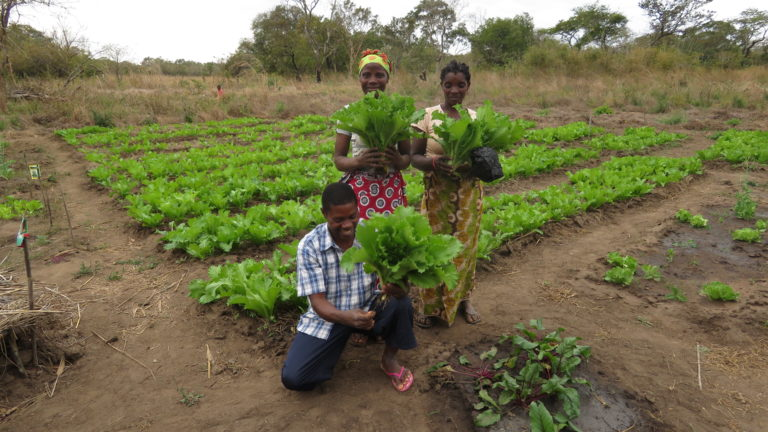 The challenge engaged students and Alumni from around the world committed to social change, offering a transformative experience. Participants formed teams that combined diverse skills and perspectives to develop innovative proposals between February and April 2025.
The challenge engaged students and Alumni from around the world committed to social change, offering a transformative experience. Participants formed teams that combined diverse skills and perspectives to develop innovative proposals between February and April 2025.
In this second edition, 83 members of the Esade community took part, including 23% undergraduate and master's students. The cohort was diverse, with 55% international participants and 41% under 30.
The proposals were evaluated by Ayuda en Acción teams in Spain and Mozambique and the Esade Alumni team, based on criteria such as adaptability, environmental sustainability, economic feasibility, human-centric and local focus, simplicity, and innovation. Selected proposals are being prepared for on-the-ground implementation, ensuring real, meaningful impact.
Recognition was given to the top five teams to gamify and energize participation, but all 15 submissions were of high quality and value.
We are confident that the final contributions will significantly enrich Ayuda en Acción’s work in Mozambique and improve many lives.
Additionally, we would like to publicly thank the finalists for their outstanding effort and the quality of their proposals.
Alberto Cueto Aleix Pons Alejandro Carazo Alejandro Mayol Alex Chacon Ana Álvarez Andrés Llano Angela Susan Issac Arshi Shah Aude Cittadini Borja Javier Bailles Carmen Ferrero Carolina Duran Carolina Fernandez Charlotte Tamagno Clara Fundarò Cristina Clavera | Elena Caroli Emma Katama Francesc Garriga Francisco Luis de Padilla Ger Anthonny Gamonal Gonzalo Ignacio Martínez Gustavo Adolfo Mendoza Guy Matthew John Locke Ignasi Casas Ingrid Cornet Isabel González Isabel Marcos Jean-Claude Lampert Josep Anton Mestre Juan Baila Lucas Federico Mejia Lucia Valldosera | M. Eulalia Conde Maria Casas María Dolores Ruiz Mario Prata Dias Alvarez Miguel Angel Herranz Miquel Petit Mireia Aguilar Noelia Martinez Pablo González Panteha Emtiyaz Patrycja Ciesluk Paula Camila Orjuela Paulina Marissa Bonilla Rafael Barba Raquel Moreno Shelly Shaurya Wanxuan Jiang |
Each participant also received a personalized letter of appreciation signed by the director of Ayuda en Acción.
Participants invested considerable time in researching successful case studies in contexts similar to Mapiko's. Based on this analysis and their knowledge, they presented valuable ideas that Ayuda en Acción will explore for future implementation. Innovative proposals included:
Focuses on transforming smallholder agriculture through sustainable technologies, food conservation, and access to local/international markets—enhancing productivity, income, and climate resilience.
Thanks to everyone’s collaboration and commitment, this second edition of open innovation between Ayuda en Acción and Esade Alumni was a success. It has proven to be a powerful catalyst for social transformation, offering vulnerable communities the opportunity for a brighter, more sustainable future. We hope to see these solutions implemented soon and witness the tangible social impact they will create.

 Ayuda en Acción has been working in Mozambique since 2006, implementing programs in Cabo Delgado and Maputo focused mainly on children, adolescents, youth, and women in local and displaced communities.
Ayuda en Acción has been working in Mozambique since 2006, implementing programs in Cabo Delgado and Maputo focused mainly on children, adolescents, youth, and women in local and displaced communities. This is where the Esade community plays a key role. Through the Designing Opportunities platform, Esade Alumni and students have presented a set of viable ideas, recommendations, and tools to strengthen Mapiko's strategy for growth, diversification, and sustainability—ensuring its social mission is not only preserved but enhanced.
This is where the Esade community plays a key role. Through the Designing Opportunities platform, Esade Alumni and students have presented a set of viable ideas, recommendations, and tools to strengthen Mapiko's strategy for growth, diversification, and sustainability—ensuring its social mission is not only preserved but enhanced. Mapiko, as a social enterprise, is a prototype initiative developed under the Work4Progress international development cooperation program by Fundación La Caixa. It stems from prior experiences led by the company Kampos SA, which founded Mapiko and is a member of the local platform supported by Ayuda en Acción. In 2025, Mapiko began formalizing its structure and activities, focusing on internal organization, legal structure, commercialization, and investment planning.
Mapiko, as a social enterprise, is a prototype initiative developed under the Work4Progress international development cooperation program by Fundación La Caixa. It stems from prior experiences led by the company Kampos SA, which founded Mapiko and is a member of the local platform supported by Ayuda en Acción. In 2025, Mapiko began formalizing its structure and activities, focusing on internal organization, legal structure, commercialization, and investment planning. Based on all this, Ayuda en Acción sought support from the Esade community to find innovative, creative, and locally viable proposals. Solutions had to help Mapiko reach more farmers, diversify production, become more resilient, and achieve financial sustainability.
Based on all this, Ayuda en Acción sought support from the Esade community to find innovative, creative, and locally viable proposals. Solutions had to help Mapiko reach more farmers, diversify production, become more resilient, and achieve financial sustainability. The challenge engaged students and Alumni from around the world committed to social change, offering a transformative experience. Participants formed teams that combined diverse skills and perspectives to develop innovative proposals between February and April 2025.
The challenge engaged students and Alumni from around the world committed to social change, offering a transformative experience. Participants formed teams that combined diverse skills and perspectives to develop innovative proposals between February and April 2025.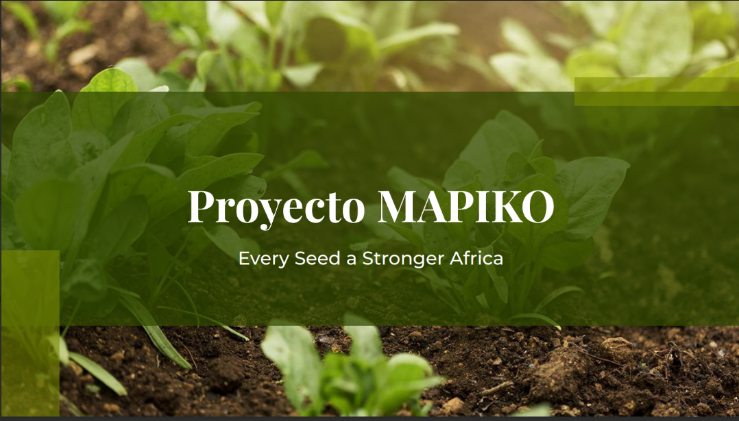
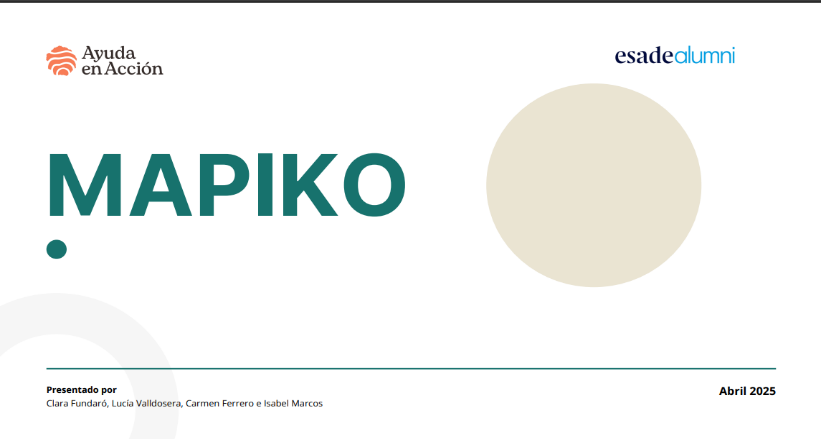 Proposes a holistic transformation of the agricultural system in Cabo Delgado with agroecological practices, sustainable technologies, and commercial partnerships, especially empowering women.
Proposes a holistic transformation of the agricultural system in Cabo Delgado with agroecological practices, sustainable technologies, and commercial partnerships, especially empowering women.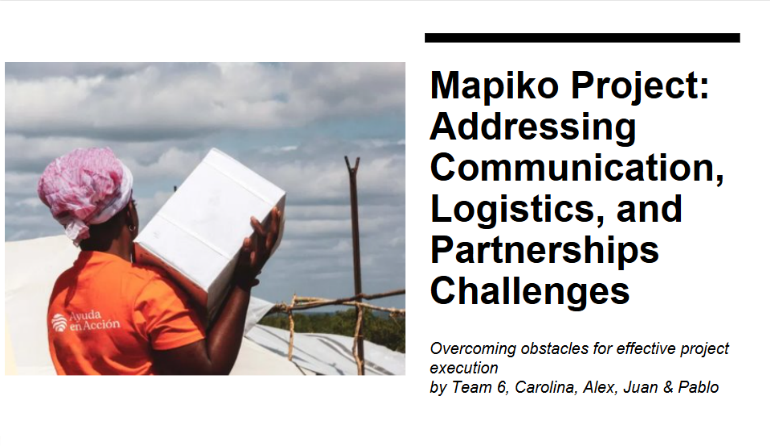 Seeks to improve logistics and communication in farming communities with low-cost solutions like solar dryers and manual records, while fostering local innovation and rural leadership.
Seeks to improve logistics and communication in farming communities with low-cost solutions like solar dryers and manual records, while fostering local innovation and rural leadership.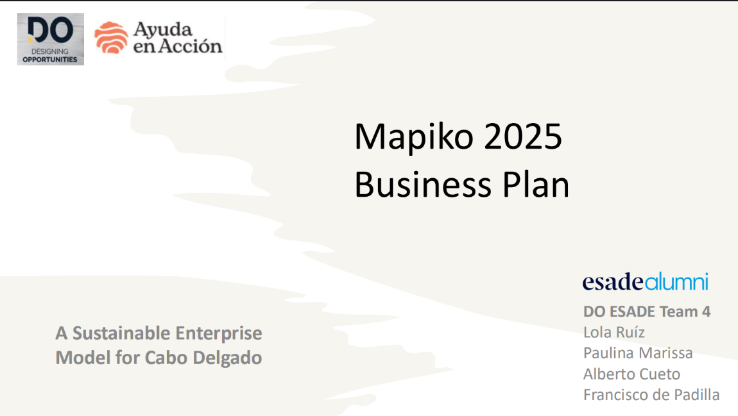 Suggests a nonprofit-based sustainable agricultural model using accessible technology and training to aggregate production and reinvest profits into the community.
Suggests a nonprofit-based sustainable agricultural model using accessible technology and training to aggregate production and reinvest profits into the community.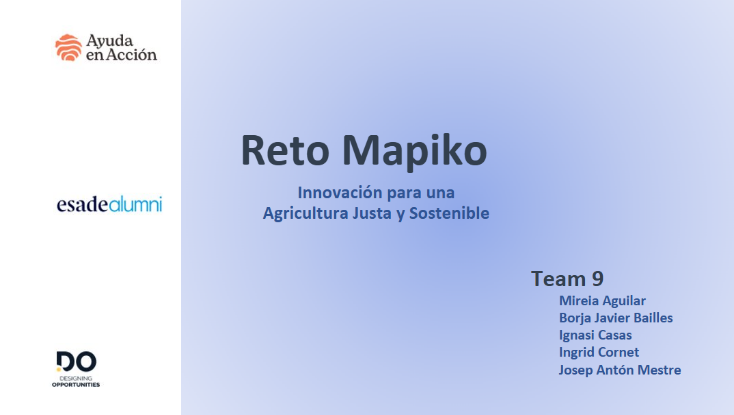 Proposes a scalable, fair production and marketing network with strategic alliances, technical and financial support for producers, and impact-tracking tools.
Proposes a scalable, fair production and marketing network with strategic alliances, technical and financial support for producers, and impact-tracking tools.
